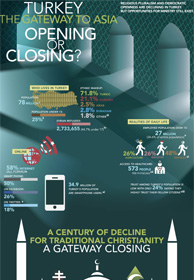Related Articles
JustinLong.org: Weekly Roundup for 02/03
Not showing up right? View this email in your browser. Was this forwarded to you? Sign up to get it every week! Know someone who could…
Seven Dynamics for Effective Evangelism
We have an impressive array of tools for evangelism; all kinds of technology that we didn’t have 25 years ago. But I wonder if, in the midst of all this, we might be missing the major dynamics for success in the Great Commission.
Is Turkey, the Gateway to Asia, Opening or Closing?
Turkey is a key gateway between Asia and Europe, but is the door opening or closing? The answer is complex but worth diving in and exploring. Take some time to go in-depth into Turkey’s demographics, relationship with Christianity and current Evangelical Church.
JustinLong.org: The Weekly Roundup, 3/24
Not showing up right? View this email in your browser. Was this forwarded to you? Sign up to get it every week! Know someone who could…
JustinLong.org: The Weekly Roundup, 6/9
Not showing up right? View this email in your browser. June 9, 2017 Data | LongReads | LifeHacks | Startups | UPG Stories | Futures | Quotes The puppy…

